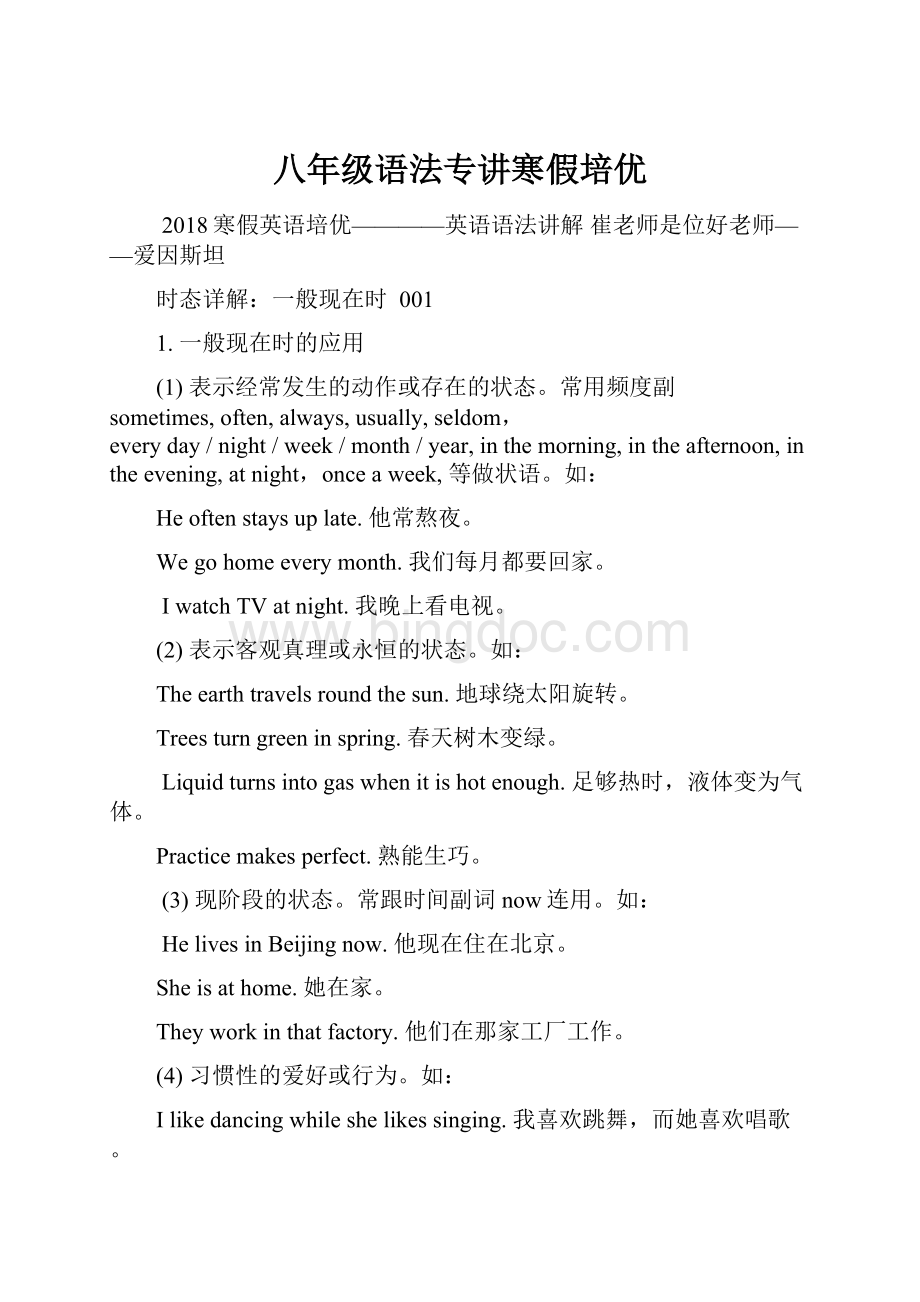八年级语法专讲寒假培优.docx
《八年级语法专讲寒假培优.docx》由会员分享,可在线阅读,更多相关《八年级语法专讲寒假培优.docx(73页珍藏版)》请在冰点文库上搜索。

八年级语法专讲寒假培优
2018寒假英语培优————英语语法讲解崔老师是位好老师——爱因斯坦
时态详解:
一般现在时 001
1. 一般现在时的应用
(1) 表示经常发生的动作或存在的状态。
常用频度副sometimes, often, always, usually, seldom,every day / night / week / month / year, in the morning, in the afternoon, in the evening, at night,onceaweek,等做状语。
如:
He often stays up late. 他常熬夜。
We go home every month. 我们每月都要回家。
I watch TV at night. 我晚上看电视。
(2) 表示客观真理或永恒的状态。
如:
The earth travels round the sun. 地球绕太阳旋转。
Trees turn green in spring. 春天树木变绿。
Liquid turns into gas when it is hot enough. 足够热时,液体变为气体。
Practice makes perfect. 熟能生巧。
(3) 现阶段的状态。
常跟时间副词now连用。
如:
He lives in Beijing now. 他现在住在北京。
She is at home. 她在家。
They work in that factory. 他们在那家工厂工作。
(4) 习惯性的爱好或行为。
如:
I like dancing while she likes singing. 我喜欢跳舞,而她喜欢唱歌。
We get up at six. 我们六点起床。
He studies very hard. 他学习很刻苦。
(5) 表示已经计划、安排好了或时间表上所安排,并且一定要做的事情。
用于这种句型的动词主要是瞬间动词:
come, go, leave, arrive, begin, start, stop, close, open等。
如:
The train arrives at five past eight and leaves at ten past eight. 火车八点过五分到,八点过十分离开。
Our class begins at 7:
45. 我们的课七点四十五开始。
The shop opens at eight o’clock. 商店八点开门。
(6) 时间、条件、方式及让步状语从句中的谓语动词是将来的动作或状态时,用一般现在时表示。
如:
If you come, we will wait for you. 如果你来,我们就等你。
When he gets here, the work will be finished. 当他到这儿时,工作将做完了。
Though he disagrees with us, he will do as we decided. 尽管他不赞成我们当观点,他还是会按我们的决定去做。
2. 一般现在时对谓语动词的要求 当主语为第一人称、第二人称或第三人称复数时,动词(除be第一人称单数用 am外) 用原形。
当主语为第三人称单数时,动词须用第三人称单数形式。
即:
(1) 动词be为is;have为has。
(2) 动词后面一般加—s。
如:
play—plays, work—works, say—says, love—loves.
(3) 在以辅音字母加—y结尾的动词后,改y为i再加—es。
如:
study—studies, satisfy — satisfies, fly—flies.
(4) 在以s, x, sh, ch, o结尾的动词后面加—es。
如:
fix—fixes, finish—finishes, watch — watches, do — does, go — goes.
3.一般现在时的否定,疑问,肯定回答,否定回答;
//am/is/are+not;don’t/doesn’t+动词原形;;;
//把be动词放于句首;用助动词do提问,若主语为第三人称单数,则用does,同时还原动词
I.用所给动词的适当形式填空。
1. Weoften___________(play)intheplaygound.
2. He_________(get)upatsixo’clock.
3. __________you_________(brush)yourteetheverymorning.
4. What (do)heusually (do)afterschool?
5. Danny__________(study)English,Chinese,Maths,ScienceandArtanschool.
6. Mikesometimes__________(go)totheparkwithhissister.
7. Ateightatnight,she__________(watch)TVwithhisparents.
8. ________Mike________(read)Englisheveryday?
9. Howmanylessons_________yourclassmate________(have)onMonday?
10. Whattime_________hismother_________(do)thehousework?
13.Myauntoften_______(look)afterherbabycarefully.
14.Youalways__________(do)yourhomeworkwell.
16.She__________(go)toschoolfromMondaytoFriday.
20.-Whatday__________(be)ittoday?
-It’sSaturday.
21.Heoften_______(have)dinnerathome.
26.Whattheyoften____(do)onSaturdays?
27.Yourparents_____(read)newspaperseveryday?
28.Thegirl____(teach)usEnglishonSundays.
29.SheandI_____(take)awalktogethereveryevening.
34.What________(do)heusually________(do)afterschool?
36.Kittysometimes__________(go)totheparkwithhissister.
37.Ateightatnight,she__________(watch)TVwithherparents.
38.________Mike________(read)Englisheveryday?
39.Howmanylessons________yourclassmates______(have)onMonday?
翻译:
1.人人生来平等。
_______________________________
2.人人都会受伤,如何面对他们,取决于我们自己。
——————————————————————
3.生活不是一场比赛,而是一场旅行。
4.如果你够努力,任何事情都可以搞定。
5.我们生活的世界充满了美景和希望。
一般过去时002
1. 一般过去时的应用 :
(1) 表示过去某时所发生的动作或存在的状态。
时间状语:
ago,yesterday,thedaybeforeyesterday,lastweek,lastyear,lastmonth,in1989,justnow,attheageof16,oneday,longlongago,,theotherday,onceuponatime…如:
Liu Ying was in America last year. 刘英去年在美国。
Jim rang you just now. 吉姆刚才给你打了电话。
(2) 表示过去经常或反复发生的动作。
如:
We often went out for a walk after supper. 我们过去常在晚饭后散步。
We usually played together. 我们通常一起玩。
3. 一般过去时对谓语动词的要求
一般过去时的谓语动词要用动词的过去式。
规则变化则遵循以下原则:
(1) 一般在动词后加-ed。
如:
play—played, offer—offered, weigh—weighed, destroy— destroyed, sign—signed.
(2) 在以字母e结尾的动词后,只加-d。
如:
like—liked, provide—provided, hate — hated, date—dated。
(3) 在以“辅音字母+y”结尾的动词后,则改y为i,再加—ed。
如:
supply—supplied, fly—flied, study— studied.
(4) 在以单短元音的重读闭音节结尾且,末尾只有一个辅音字母的动词后,双写最后一个辅音字母,再加-ed。
如:
plan—planned, refer—referred, regret—regretted, ban—banned.
4. 特别说明
有些动词的过去时,如:
expect, hope, intend, plan, want 等一般过去时,后接不定式的完成时;或它们的过去完成时接不定式的一般式,都可表示过去未曾实现的意图、打算或希望。
如:
I hoped to have been invited to his wedding party. —I had hoped to be invited to his wedding ceremony. 我本希望他来邀请我参加他的婚礼。
I intended to have joined their games. —I had intended to join their games. 我本打算参加他们的比赛。
5.一般过去时疑问句,否定句:
was/were+not;didn’t+动词原形;
疑问句:
was或were放句首;用did提问
6.usedtodo//would+动词原形
一、写出下列动词的过去式
1.am/is________2.do_______3.go________4.have_______
5.isn’t_________6.aren’t________7.spend________8.cook_______
9.read________10.clean_______11.live_______12.study_________
二、用适当的词完成下列对话
1.—Howwasyourweekend?
—It______great.
—What_______you______lastweekend?
—I_______somehomework.
2.—What______she______lastweekend?
—She_______tothebeach.
3.—What_______theydolastweekend?
—They________tothemovies.
三、用括号内所给词的适当形式填空
1.We_________(enjoy)ourselvesatthepartylastnight.
2.Jack____________(study)fortheEnglishtestlastSunday.
3._______you______(go)totheGreatWalllastyear?
4.Whatday_______(be)ityesterday?
5.Theoldman_______(be)illandwenttoseeadoctor.
7.We__________(visit)themuseumandwenthome.
8.—How_______(be)thestudents?
—Theywereveryfriendly.
9.Heoften_______(have)supperathome.Todayhe______(have)supperatschool.
四、句型转换
1.Hecameherelastmonth.(改为否定句)He______________herelastmonth.
2.Theyplayedfootballthismorning.(改为一般疑问句并作简略回答)
—______they_______footballthismorning?
—Yes,they_______./No,they_________.
3.TheywenttoBeijinglastyear.(就划线部分提问)
__________________they________lastyear.
4.TomwatchedTVlastnight.(改为一般疑问句)_______Tom_______TVlastnight?
5.Marydoeshomeworkeveryday.(用lastnight改写句子)
Mary_____________________________________.
七、用所给动词的适当形式填空
1.TomandMary___________(come)toChinalastmonth.
2.Mike_________________(notgo)tobeduntil12o’clocklastnight.SoI_______(get)uplate.
4.There_________(be)noonehereamomentago.
6.Ilistenedbut___________(hear)nothing.
12.—Whattime_______you_______(get)toBeijingyesterday?
—We__________(get)toBeijingat9:
00intheevening.
13.What__________(make)himcry(哭)justnow?
14.Lastyeartheteacher___________(tell)usthattheearthmovesaroundthesun.
15.There____________atelephonecallforyoujustnow.(be)
16.There__________notenoughpeopletopickapplesthatday.(be)
17.There_____________anyhospitals(医院)inmyhometown(家乡)in1940.(benot)
18.There____________enoughmilkathomelastweek,wasn’tthere?
22.Jack____________(notclean)theroomjustnow.
25.It________(be)hotyesterdayandmostchildren_______(be)outside.
26.There________(be)afootballmatchonTVyesterdayevening,butI_________(have)notimetowatchit.
27.Heatesomebreadand_________(drink)somemilk.
翻译:
仔细体会一般过去时的用法,场合
1.我是2000年搬家到深圳的。
2.从前有个朋友,他患了癌症。
3.Tom点点头然后回到了他的座位上。
4.她很惊讶的发现她的狗狗丢了。
5.妈妈很感动地打开了礼物。
一般将来时003
1. 一般将来时的结构及应用
(1) shall / will + 动词原形。
表示即将发生的动作或存在的状态。
标志词:
tomorrow,thedayaftertomorrow,nextyear,nextmonth,nextweek,inthreeweeks…
如:
What shall we do if he doesn’t come?
如果他不来,我们该怎么办?
Will you be free this evening?
今天晚上有空吗?
I think he will tell us the truth. 我想他会告诉我们真实情况的。
(2) be going to + 动词原形。
表示已经计划或安排好了的事情,也可表示有迹象表明肯定要发生的事情。
如:
We are going to have a meeting to discuss the matter this evening. 今天晚上开会讨论这件事情。
Look at the black clouds over there. I think it is going to rain soon. 看一看那边的乌云,我想天要下雨了。
There is going to be an English evening this week. 本周要举行一个英语晚会。
(3) be about to + 动词原形,一般和when连用,表示就要做或正好要做的事情。
往往暗含一种时间上的巧合,因此,句子不能再用时间状语。
如:
Don’t leave. Li Lei is about to come. 不要走了,李蕾就要来了。
Be quiet. The concert is about to start. 安静下来,音乐演唱会就要开始了。
Iwasabouttoleavewhenhecamein.当他进来时我准备离开。
4:
否定句形式
(1)..主语+be(am,is,are) not going to+动词原形+......
例如:
(A):
I am not going to play basketball tomorrow. 明天我不将踢足球.
(B). She is not/isn't going to visit Shanghai next year. 明年她不将参观上海.
(2)..主语+will/shall not+动词原形+.....
(A). I shall not go to school the day after tomorrow。
后天我不将上学了(B). I will not write my homework this evening.(will notl=I won't) 今晚我不将写作业
3.一般疑问句:
(A).Am/Is,Are+主语+going to+动词原形+....
例如 (A). --Am I going to see my grandfather tomorrow?
(2).Will//shall+主语+动词原形+...
例如 (A). --Shall we play volleyball next class?
下一节课我们将打排球吗?
--Yes,you will. 是的,你们将No,youwon’t.
练习题:
单选题:
1. There __________ (be)a meeting tomorrow afternoon.
2. Charlie ________ (notwork)here next month.
3. He ________ (be)very busy this week, he ________ (be)free next week.
5.–________you________freetomorrow?
–No.I________freethedayaftertomorrow.
A.Are;goingto;willB.Are;goingtobe;will
C.Are;goingto;willbeD.Are;goingtobe;willbe
8.–Whereisthemorningpaper?
–I________ifforyouatonce.
A.getB.amgetting
C.togetD.willget
9.________aconcertnextSaturday?
A.TherewillbeB.Willtherebe
C.TherecanbeD.Thereare
10.Iftheycome,we________ameeting.
A.haveB.willhave
C.hadD.wouldhave
11.He________(give)herabeautifulhatonhernextbirthday.
12.He________(write)tousassoonashe____(get)there.
13.He________inthreedays.
A.comingbackB.cameback
C.willcomebackD.isgoingtocomingback
14.Ifit________tomorrow,we’llgoroller-skating.
A.isn’trainB.won’train
C.doesn’trainD.doesn’tfine
15.–W